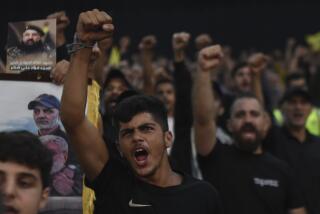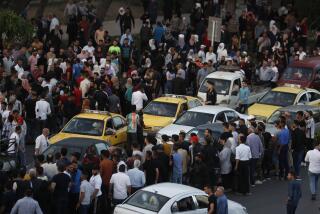Death and Hope in Iraq
- Share via
American troops have struck a major blow to those hoping for the return of Iraqi dictator Saddam Hussein and his fanatical entourage. The killing of Hussein’s two sons in a firefight Tuesday also should boost hopes for the beleaguered American occupation in Iraq.
Two weeks ago, L. Paul Bremer III, the top civilian administrator in Iraq, called Saddam and sons Uday and Qusai “among the most evil men the world has known,” and their record of torture and murder attests to that description.
Bremer’s announcement of a $15-million reward for information leading to the capture of each of the two sons demonstrated their importance. Lt. Gen. Ricardo Sanchez, commander of U.S. ground forces in Iraq, said troops attacked a house in Mosul, in northern Iraq, after getting a tip that the sons were hiding there. That underscores the value of good intelligence and the need for Iraqi cooperation.
The deaths of Saddam’s sons could lessen the daily attacks on U.S. troops as Iraqis see further evidence that the old regime is gone for good. Saddam’s capture or death would be the most visible evidence of that; still, more than 30 of the 55 Iraqis most wanted by U.S. forces have been captured or killed.
Occupation forces blame most of the continuing guerrilla attacks on former Iraqi soldiers and Baath Party leaders loyal to Saddam and his sons, who played major roles in the feared security services. Testimony from Iraqi defectors portrayed Uday as a psychopath; he was so volatile that Saddam reportedly removed Uday’s designation as heir apparent and shifted his favor to Qusai, every bit as dangerous but lower key. It will be important for the Bush administration not to gloat over these deaths. Opponents of the war will shed no tears for the duo. But for many nations, the evil done by Saddam and his sons did not justify the preemptive U.S. invasion of Iraq. Even Iraqis happy to have Uday and Qusai gone may be unhappy that it was the American invaders who killed them.
But if the sons’ absence diminishes attacks not just on Americans but also on utility installations, the restoration of lights and water will improve life in Baghdad and elsewhere and reduce the hostility toward U.S. soldiers. The widespread postwar looting surprised occupation forces and has made life more difficult for many Iraqis than it was under Hussein. Threats against “collaborators” also have scared many Iraqis from cooperating with Americans. Those fears should now diminish, but occupation forces still need to increase security and employment for Iraqis.
Osama bin Laden continues to tape exhortations to his followers, and Saddam Hussein has taped his own rallying cries against the infidels. Mullah Mohammed Omar remains free in Afghanistan. U.S. forces can derive satisfaction in hunting down at least two of the most wanted, even as they hunt the others.
More to Read
Sign up for Essential California
The most important California stories and recommendations in your inbox every morning.
You may occasionally receive promotional content from the Los Angeles Times.










